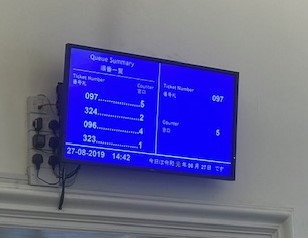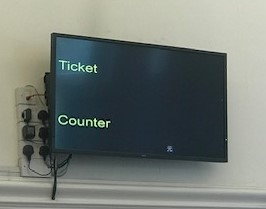Japanese Time Format
#1
FlyerTalk Evangelist
Original Poster
Join Date: Mar 2010
Programs: DL, OZ, AC, AS, AA, BA, Hilton, Hyatt, Marriott, IHG
Posts: 19,903
Japanese Time Format
I've never seen 24:30 used elsewhere in the world. What's the origin and what do I need to know when I see posted times?
#2
Join Date: Jun 2023
Location: KIX/UKB/ITM
Programs: Marriott Bonvoy Platinum
Posts: 44
I also only saw it used in Japan.
Sometimes businesses use it if they are open until late at night.
Maybe they think it would be confusing to write open from 10am to 2am, as 2am would be already the following day.
So they use the 24 hour format and just continue counting after 24 hours until the end of the "business day".
For example open from 10:00 to 26:00 would mean, open from 10am to 2am the next day.
23:00 (11pm), 24:00 (midnight), 25:00 (1am), 26:00 (2am)
Sometimes businesses use it if they are open until late at night.
Maybe they think it would be confusing to write open from 10am to 2am, as 2am would be already the following day.
So they use the 24 hour format and just continue counting after 24 hours until the end of the "business day".
For example open from 10:00 to 26:00 would mean, open from 10am to 2am the next day.
23:00 (11pm), 24:00 (midnight), 25:00 (1am), 26:00 (2am)
#3
Join Date: Jun 2005
Location: TYO
Programs: Tokyo Monorail Diamond-Encrusted-Platinum
Posts: 9,633
Wikipedia states that a 30-hour clock is used in written communications by businesses whose hours straddle midnight and in late night schedules for TV and radio stations:
https://en.wikipedia.org/wiki/Date_a...ation_in_Japan
I have a feeling that referring to hours beyond 24 is just a thing that came about randomly / casually without a formal standard. But perhaps Wikipedia is right that there's an established convention that limits it to 30.
https://en.wikipedia.org/wiki/Date_a...ation_in_Japan
I have a feeling that referring to hours beyond 24 is just a thing that came about randomly / casually without a formal standard. But perhaps Wikipedia is right that there's an established convention that limits it to 30.
#4
FlyerTalk Evangelist
Original Poster
Join Date: Mar 2010
Programs: DL, OZ, AC, AS, AA, BA, Hilton, Hyatt, Marriott, IHG
Posts: 19,903
Wikipedia states that there's a 30-hour clock convention that's used in written communications by business whose hours straddle midnight and in late night schedules for TV and radio stations:
https://en.wikipedia.org/wiki/Date_a...ation_in_Japan
I have a feeling that referring to hours beyond 24 is just a thing that came about randomly / casually without a formal standard. But perhaps Wikipedia is right that there's an established convention that you can only count hours as far as 30.
https://en.wikipedia.org/wiki/Date_a...ation_in_Japan
I have a feeling that referring to hours beyond 24 is just a thing that came about randomly / casually without a formal standard. But perhaps Wikipedia is right that there's an established convention that you can only count hours as far as 30.
#5
Join Date: Jun 2005
Location: TYO
Programs: Tokyo Monorail Diamond-Encrusted-Platinum
Posts: 9,633
If you think that's funny, you'll be in stitches when you learn how the Japanese count years.
When the era changed from Heisei to Reiwa in 2019, people were left carrying driving licenses with expiry dates in Heisei 32,33,34, and 35 - years that never came to be. Who could have foreseen such an issue? [/sarcasm]. And who installed a queue management system at the Japanese embassy in London, which required a hillbilly hack to display gan (元)? (Gan is used rather than number 1, during the first, partial year of the new era). Oops.

LCD screen with "gan" taped over the location for year number.

LCD screen with "gan" taped over the location for year number.
When the era changed from Heisei to Reiwa in 2019, people were left carrying driving licenses with expiry dates in Heisei 32,33,34, and 35 - years that never came to be. Who could have foreseen such an issue? [/sarcasm]. And who installed a queue management system at the Japanese embassy in London, which required a hillbilly hack to display gan (元)? (Gan is used rather than number 1, during the first, partial year of the new era). Oops.

LCD screen with "gan" taped over the location for year number.

LCD screen with "gan" taped over the location for year number.
#7
Join Date: Sep 2004
Location: Kobe/Osaka
Programs: Delta
Posts: 1,587
A bit off topic, maybe, but related to talking about time in Japan. The term "Good morning" (ohayou gozaimasu) is used the first time that day when you meet someone who you routinely work with, even if it's actually in the afternoon. Well, at least in my part of Kansai. The first few times I experienced it, I would want to show them my watch and the actual time, but of course just kept quiet. My experience in the US was that people were rather precise about saying "Good morning" or "Good afternoon" based on the time. Not so much in Japan.
#8
Join Date: Jun 2012
Posts: 3,384
In USA, people look at you weird if you use 2400 time, and think you're in the military (bc usa military uses 2400). I guess subtracting 1200 is too hard for some people

https://news.ycombinator.com/item?id=12887647
#9
Original Member
Join Date: May 1998
Location: Tokyo, Japan (or Vienna whenever possible)
Posts: 6,379
A bit off topic, maybe, but related to talking about time in Japan. The term "Good morning" (ohayou gozaimasu) is used the first time that day when you meet someone who you routinely work with, even if it's actually in the afternoon. Well, at least in my part of Kansai. The first few times I experienced it, I would want to show them my watch and the actual time, but of course just kept quiet. My experience in the US was that people were rather precise about saying "Good morning" or "Good afternoon" based on the time. Not so much in Japan.
#11
Join Date: Feb 2008
Location: Kobe, Japan
Programs: Bonvoy Platinum, IHG Diamond, Hyatt Discoverist
Posts: 1,534
A bit off topic, maybe, but related to talking about time in Japan. The term "Good morning" (ohayou gozaimasu) is used the first time that day when you meet someone who you routinely work with, even if it's actually in the afternoon. Well, at least in my part of Kansai. The first few times I experienced it, I would want to show them my watch and the actual time, but of course just kept quiet. My experience in the US was that people were rather precise about saying "Good morning" or "Good afternoon" based on the time. Not so much in Japan.
#13
Join Date: Feb 2013
Location: Beantown! (BOS)
Programs: AA PtPro (2 MM); Hilton Diamond; Hertz President Cr; DL SkyMiles; UA MileagePlus
Posts: 3,438
The general public in Japan, I think it was the young generation who first started to greet "ohayo gozaimasu" when showing up regardless of the time of the day. The young generation was mimicking what they saw celebrities doing on the TV or radio. This was how many decades ago...? Back at that time, adults would look at that as young kids not knowing manners and don't know proper Japanese. But now this has spread to middle age and elderly groups, especially in the workplace. But outside of the workplace, especially with people not familiar, it is still time defined greetings; ohayou gozaimasu for mornings, kon-nichiwa for afternoons, and konbanwa, for evenings.
As for 25:00 (not 01:00 or 1:00 a,m,), I looked up, and seems like this was started by newspapers. Before the Internet, TV and radio schedules were printed in newspapers (newspapers still do) in Japan. Japan did not have a TV Guide (not in '60s and '70s). I vaguely remember the TV Guide was introduced in Japan in the late '80s or somewhere around that time. Anyway, starting in the late '60s and '70s, TV stations and radio stations in Japan started to broadcast late at night, beyond 12 midnight. Newspapers started to use 25:00-26:00 on TV and radio schedules. Yes, there are no standard rules regarding the format of the 25:00 type time display. One piece of information I found suggested the use of the 25:00 format became more widespread during the bubble economy era of Japan (1986-1991). During the bubble era, many businesses in Japan extended their business hours, izakaya, conbimi, family restaurants, etc. which led to 24 hrs. operations.
As for the use of 24 hrs. system in Japan, it was the railway company started to use 24 hrs. system. Japan National Railways (predecessor of JR) used to have a lot of long distance trains that ran day and night, including local trains which stopped at every station. JNR had long distance local service which ran Ueno (Tokyo)-Sendai, Ueno-Niigata, Tokyo -Osaka, etc. To avoid confusion about departure and arrival times, JNR started to use 24 hrs. system, and the use of 24 hrs. system spread in Japan.
#14
Join Date: Oct 2015
Location: next to HAM
Programs: LH M+M
Posts: 960
Now switch to a 30h clock :-D
#15
Join Date: Feb 2013
Location: Beantown! (BOS)
Programs: AA PtPro (2 MM); Hilton Diamond; Hertz President Cr; DL SkyMiles; UA MileagePlus
Posts: 3,438
At least, when booking JL41 HND-LHR on the JAL website it says departure Wednesday 00:10, not departure Tuesday 24:10. 




















